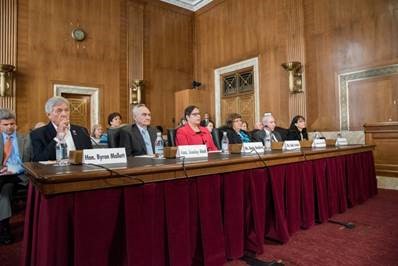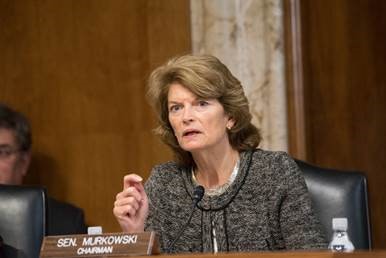Murkowski: Federal Government Forcing Isolated Alaska Native Community to Live in Fear
Washington, D.C. – U.S. Sen. Lisa Murkowski, R-Alaska, today conducted oversight of the Department of the Interior’s callous decision to deny the Alaska Native community of King Cove reliable access to medical transportation. Murkowski pointed to the administration’s rejection of an 11-mile, non-commercial use, gravel road that would give residents of King Cove access to emergency medical care through the all-weather airport in nearby Cold Bay, Alaska.
“The Interior Department’s heartless decision to reject access to life-saving emergency medical care was callous and cynical. It shattered the trust responsibility that the federal government is supposed to have to our nation’s Native peoples. It has left the people of King Cove in the same situation they have been in for decades: at the mercy of the elements, left to suffer needless pain, and perhaps even death, should they ever have a medical emergency,” Murkowski said. “It’s time to ensure that King Cove finally has reliable access to emergency medical transportation – something that virtually every other American takes for granted.”
Murkowski, chairman of the Senate Energy and Natural Resources Committee, at Thursday’s hearing received testimony from residents of King Cove about the life-and-death choices they face in trying to reach safety during medical emergencies.

Witnesses testify at Thursday’s Senate committee hearing.
Alaska Lt. Gov. Byron Mallott reiterated the state’s support for the road connecting King Cove to Cold Bay and dismissed the notion that the needs of wildlife are more important than needs of humans.
“Certainly we need appropriate and timely public policy to frame our ability to manage Alaska’s lands and other lands. But we also need to recognize that we are as important on this land as anything else and we probably are the most fragile,” Mallott said. “Particularly those who live in rural and remote Alaska, those living and breathing human beings who have been there for generations, and those who have arrived yesterday and desire and choose to live for continuing generations, that their reality, their importance, their aspirations, their desire for their ability to live on that land needs somehow to be recognized and brought into a proper balance that does not exist today.”
Mayor Stanley Mack of Aleutians East Borough voiced his frustration and disappointment at the administration’s continued efforts to block the life-saving road and called into question the federal government’s commitment to our nation’s Native communities.
“It also became very clear to me that any trust responsibility for indigenous Americans or government-to-government relations are just a bunch of fancy words,” Mack said. “We must have this modest, one-lane gravel road to mitigate these very high-risk air and marine transportation options for transporting our sick and injured residents. Our proposed road is the most logical, safe, and affordable alternative.”
Ms. Denise Desiderio, policy and legislative director for the National Congress of American Indians, voiced support for the life-saving road and pointed to the fact that the Alaska Native residents of King Cove have a deep interest in protecting the surrounding environment, as they have done for more than 4,000 years – long before local lands were designated as wilderness by the federal government from thousands of miles away.
“Nowhere is [access to emergency medical assistance] more relevant than in American Indian and Alaska Native communities who ceded millions of acres of land to form the United States,” Desiderio said. “There is no other group that has more at stake regarding the protection of the environment than the Aleut Native population which has inhabited the King Cove area for more than 4,000 years.”
Ms. Della Trumble, a lifelong resident of King Cove and member of the Agdaagux Tribe, knows firsthand the struggle that residents of the Alaska Native community must undergo to receive emergency medical care, as she saw a small aircraft carrying her daughter crash on King Cove’s gravel airstrip due to severe weather conditions.
Ms. Della Trumble’s daughter (in blue) after her plane’s crash landing on King Cove’s airstrip due to weather conditions. Photo Courtesy of the Aleutians East Borough.
“No mother should ever have to witness their own precious daughter crash land at the King Cove airstrip… It was the scariest few minutes of my life as I sat there watching the plan be pushed downward by the wind and crash land on the runway without its landing gear down.” Trumble said. “We will never quit until we are successful in our quest to achieve a safe, dependable, and affordable transportation solution for our residents. We know the only logical solution is a modest, non-evasive, one-lane gravel road.”
U.S. Coast Guard Commander John Whiddon (Ret.) delivered emotional testimony about his experience responding to the scene of a plane crash outside the Cold Bay Airport where all occupants on the plane perished, while transporting a medical emergency from King Cove to Cold Bay in severe weather conditions. Whiddon testified that had ground transportation been available, the recovery operation could have been avoided.
“In hindsight, this SAR case to recover four crash victims could have been avoided if there had been ground transportation between King Cove and Cold Bay. In addition to the loss of lives, the two helo crews and a C-130 crew were put at risk as they flew many hours in heavy snow and high winds to locate the crash site and recover the bodies,” Whiddon said.
Murkowski concluded the hearing vowing to continue the fight for King Cove to ensure that it finally has reliable access to emergency medical care through an 11-mile, one-lane, non-commercial, gravel road.
Witness testimony and archive video of today’s hearing is available on the Senate Energy and Natural Resources Committee website.









